
2019 Gold Medal Classroom Article Index
05 December 2019Miss one GMC story and you might miss a valuable teaching resource.
By Lisa Parrish, GMC Editor
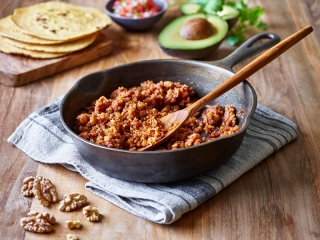 Another year of “Gold Medal Classroom” (GMC) is in the books. Every issue contains stories geared toward culinary education. It’s a reliable source of information focusing on topics from flavor trends to new applications ready for teaching in culinary kitchens. Columnists present ideas on teaching students at all levels, from high school to four-year degree programs as well as topics that appeal to program directors and deans.
Another year of “Gold Medal Classroom” (GMC) is in the books. Every issue contains stories geared toward culinary education. It’s a reliable source of information focusing on topics from flavor trends to new applications ready for teaching in culinary kitchens. Columnists present ideas on teaching students at all levels, from high school to four-year degree programs as well as topics that appeal to program directors and deans.
Even though GMC is not a book, it can be accessed over and over again at www.CafeMeetingPlace.com. Just like your favorite cookbook, you can read articles you may have missed or refresh yourself on stories you found interesting. Look for features that focus on the movers and shakers in the culinary industry, tips and ideas for classroom instruction, and instructional resources from the foodservice industry.
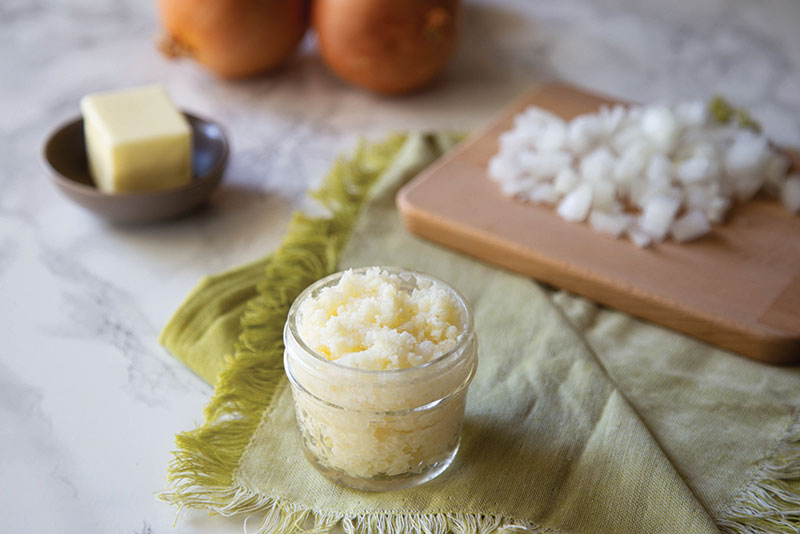 Help complete your knowledge of the full food cycle by reading about the farmers who work to grow the food delivered to your kitchen door. As you read the stories, perhaps you will see how farmers and chefs are alike in their desires to feed the world quality, good tasting food.
Help complete your knowledge of the full food cycle by reading about the farmers who work to grow the food delivered to your kitchen door. As you read the stories, perhaps you will see how farmers and chefs are alike in their desires to feed the world quality, good tasting food.
Each month CAFÉ sends an edition announcement informing you there are new stories posted on the website www.CafeMeetingPlace.com. If you are not receiving these emails, please click here to register for the notice. You won’t miss another GMC story in 2020!
FEATURE ARTICLES
Ingredients
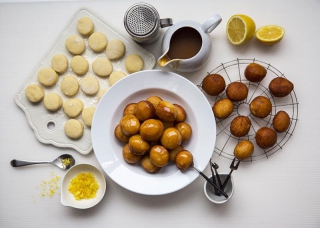 Onion Hacks: These culinary instructors know how to shave time when cooking with onions.
Onion Hacks: These culinary instructors know how to shave time when cooking with onions.- Popular bowls brimming with mushrooms feature added umami, nutrition and versatility.
- Consumption of imported seafood is on the rise. Working with distributors allows chefs to source sustainable seafood when placing orders.
- Go authentic by cooking with indigenous fats and oils.
- Chef Jason Gronlund of Ardent Mills explains how to include grains into unusual applications while adding interesting ingredient and origin stories.
- Watermelon is ready for the season with new flavor pairings and a downloadable pairing chart.
- See, smell, taste, experiment with and customize the complex flavor of traditionally fermented and brewed soy sauce.
- Dehydrated and frozen Idaho®potatoes help chefs control food costs and safety while offering customizable applications across all dayparts.
- The science of chocolate starts in the Cacao fruit trees and transforms the humble pod into a sweet ingredient nearly everyone thinks they know.
- Raspberries from whole to crumbles add rich flavor, vibrant color and nutrition to baked items.
- Pairing canned pears with autumn baking applications.
- Are you nuts? Plant-forward applications utilizing nuts from a southern-style boiled peanut hummus to dairy-free walnut cream to pecan meal as a flavorful coating.
Instructor resources
- Professional development courses help instructors enhance their knowledge and skills through the convenience of online - and in many cases free – courses.
- Food safety standards – worth all the effort?
- Pork, seafood, veg-centric dishes, culinary wellness and food waste reduction top CAFÉ conference agenda.
- Introducing students to fruit flavors beyond the apple-banana-orange range builds taste palates and a fine food understanding.
- CAFE honors nine culinary instructors at annual June Leadership Conference.
- The art of charring: The flavor enhancer that delicately sits between perfectly caramelized and burnt.
- Strategies for teaching soups: Soups pouring into healthy and ethnic culinary trends.
- CAFE’s Journal of Culinary Education Best Practices seeks culinary academic articles.
Student-focused stories
- $800,000 in scholarships offered by the NRA Educational Foundation.
- Culinary competition awards life-changing scholarships to underserved youth.
- ProStart 2019 Management Winner: High school students from Mansfield, Texas, impressed judges with their half and half concept while maintaining a “One Team, One Dream” motto.
- ProStart 2019 Culinary Winner: Texas winners wow judges with perfect dishes, including a white chocolate chai mousse in the sculpted shape of an apple.
- The ACFEF updated its apprenticeship program in the face of changing foodservice needs and tech-savvy culinarians new to the field.
Trends
- An ACF Survey finds craft, artisan, and locally produced beverages lead the 2019 beverage trends.
- Combing through the sweet pair of honey and breakfast within culinary trends.
MAYO’S CLINIC
Customer service
 Great customer service extends beyond solid table service. Teach students the broader definition and art of customer service.
Great customer service extends beyond solid table service. Teach students the broader definition and art of customer service.- Assignments like student-created customer service training manual or role playing help instructors teach customer service excellence.
- Evaluating students’ customer service skills by determining precise skills to assess, evaluate and methods to effectively communicate feedback. An added bonus: an online rubric.
- Teaching strategies for encouraging positive attitude while serving customers.
- Dr. Fred Mayo illustrates the importance of attitude and behavior when resolving customer service issues. Did the server thank the complainer?
Teaching research
- Encouraging research among students.
- Dr. Fred Mayo discusses key aspects of presenting research findings via a visual medium.
- Instructing students on how to write clear, coherent and readable research papers while enjoying the process.
Other teaching resources
- Understanding civility and its importance both in the classroom and public life.
- Curiosity leads to success in and out of the classroom.
THINK TANK
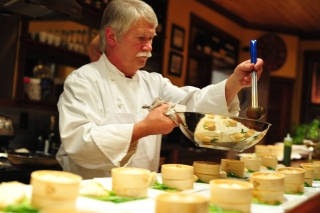 The most important director’s task is thinking beyond today’s chaos and planning for the best future culinary program. Chef Paul Sorgule provides stepping stones to achieve strong future strategies.
The most important director’s task is thinking beyond today’s chaos and planning for the best future culinary program. Chef Paul Sorgule provides stepping stones to achieve strong future strategies.- A paradigm shift is upon us.
- Building a program brand through perception.
- Define a culinary school’s position in the marketplace.
- The end is just the beginning.
- What does it mean to be a teacher?
- Instructors and students need to build assessment tools.
- It’s not enough to teach cooking. Workplace settings must be cleansed of chefs with minimal leadership skills, an inability to build teams and those who exhibit erratic behavior.
- Culinary curriculum sequencing should mirror the progressive, sequential needs from survival to actualization described by Maslow’s theory.
- Embracing change in culinary education is long overdue.
50 MINUTE CLASSROOM
Teaching resource
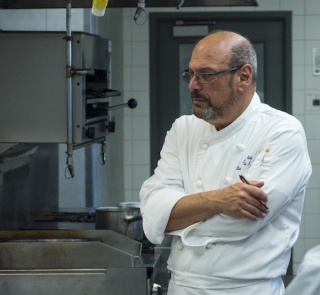 Defensive cooking: fixing burnt and stupid requires an improvised, ready at a moment’s notice, back-up plan without panicking.
Defensive cooking: fixing burnt and stupid requires an improvised, ready at a moment’s notice, back-up plan without panicking.- Culinary instructors teach more than cooking skills.
- Teaching cooks about chefs.
- Three-part capstone project pulls together a culinary education.
- New employees (or former students) need to know how to handle the government’s help in the form of the health inspector.
- Chef Adam Weiner describes when and how to use instant read thermometers, probe thermometers and infrared sensors.
- Teaching measuring correctly with scales, cups and teaspoons.
Instructor resource
- Fifty Minute Classroom’s centennial article index.
- Modernizing curriculum requires change.
- Technical Advisory Committee meetings led by industry experts and not culinary program instructors.
MEET THE GROWERS
 Walnuts: Farmer Carl Cilker found that California’s Central Valley had key requirements to grow heart-healthy walnuts. He just needed time to grow the trees.
Walnuts: Farmer Carl Cilker found that California’s Central Valley had key requirements to grow heart-healthy walnuts. He just needed time to grow the trees.- Mangos: Chefs and a Puerto Rican mango farmer face similar challenges and opportunities while operating their businesses.
- Soybeans: The versatile soybean sought after for its oil and high protein content has become an economically volatile crop over the past year.
- Honey: A beekeeper's sweet story.
- Mushrooms: Shining the Light on Growing Mushrooms in the Dark
- Potatoes: Farmer Bryan Wada understands his fate is directly tied to the Idahoan ground where he both farms potatoes and lives.
- Chickens: Eleventh-generation farmer Jenny Rhodes discusses her pride in raising chickens and farming life.
- Corn and Whiskey: Whiskey Acres Distillery is taking the farm-to-table culinary movement and distilling it to a science on the farm.
Click here to read the 2018 Gold Medal Classroom article index.
